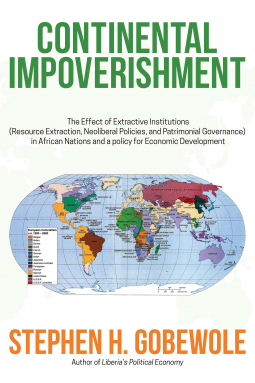
Continental Impoverishment
The Effect of Extractive Institutions Resource Extraction, Neoliberal Policies, and Patrimonial Governance in African Nations and a Policy for Economic Development
by Stephen H. Gobewole
This title was previously available on NetGalley and is now archived.
Send NetGalley books directly to your Kindle or Kindle app
1
To read on a Kindle or Kindle app, please add kindle@netgalley.com as an approved email address to receive files in your Amazon account. Click here for step-by-step instructions.
2
Also find your Kindle email address within your Amazon account, and enter it here.
Pub Date Mar 15 2018 | Archive Date Aug 12 2018
Talking about this book? Use #ContinentalImpoverishment #NetGalley. More hashtag tips!
Description
Africa is a continent of contrasts, with some of the lowest literacy rates and nations with the highest number of people living in poverty. Yet beginning a few hundred years ago, this same continent was rich in resources coveted by more advanced nations, today’s wealthy Western and European countries. African minerals, raw materials, and even humans were traded for cash or services that benefited African leaders, families, or tribes, but this wealth was not distributed across the general population. The combination of resource extraction, neoliberal policies, and patrimonial regimes is the foundation for the abject poverty and poor literacy that exists in many African nations today.
This book uses data provided by highly regarded international organizations, such as the Index of Economic Freedom, The Global Innovation Index, The Intelligence Unit Democracy Index, and Corruption Perception Index. This research supports the theory that Africa’s perpetual poverty is a result of the extractive transfer of natural resources, the implementation of neoliberal trade policies, and the ongoing support of bad governance and poor leadership.
The author is a native of Liberia, and his focus of higher learning has been management, finance, and public policy. He proposes that African countries adopt protectionist policies that foster a learning community, enhance economic development, and increase living standards while eliminating patrimonialism and establishing a modern state. Economic development that trains and educates citizens leads to a reduction in poverty and a strong civil society that improves the governance of African nations.
Available Editions
| EDITION | Paperback |
| ISBN | 9781457561801 |
| PRICE | $19.95 (USD) |



